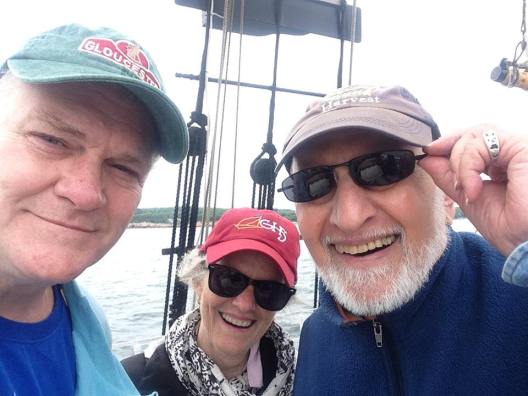
Guests of the captain aboard Adventure as she pulls away from Maritime Wharf for her first official passenger cruise in 27 years.
The Schooner Adventure sailed proudly from Maritime Wharf in Gloucester Harbor Saturday afternoon, past Pavilion Beach crowded with Fiesta revelers, and 13 miles out to sea toward Boston, with an appreciative group of 65 guests on board. With that four-hour trip, Adventure reclaimed her place on Gloucester Harbor.
No longer a work project, Adventure has again taken her place as a functioning member of Gloucester’s working waterfront, where she made her mark from 1926-1953 as a high-liner, a workhorse of Gloucester’s historic schooner fleet, becoming, by her last season as a fishing schooner in 1953, the last of the legendary Grand Banks fishing schooners.
The guests for this first passenger cruise since Adventure was issued official passenger certification by the US Coast Guard a few weeks ago were all friends and family of Adventure’s Captain Stefan Edick and president of the board of Schooner Adventure, John Morris. For each person walking down the gangplank, the afternoon’s outing held its own significance.
Helen Garland, widow of Joe Garland, renowned Gloucester historian and author, Adventure’s principal fundraiser and advocate for the 27-year, 4.5 million-dollar restoration project, was pleased to be on deck for Saturday’s trip, surrounded by people, natives as well as newcomers who “represent various aspects of Joe’s vision for Adventure.”
“We have with us today,” she said, ” our native sons like author Peter Anastas and Captain John Morris, symbols of Gloucester’s proud heritage, along with our new friends like Bing McGilvray, who respect that heritage and have chosen to become part of Gloucester’s story. The children running over the deck, they all give me hope for the future. Gloucester and Adventure are proof of the spirit and bravery …that created the vital democratic energy which defined this country.”

Three members of Enduring Gloucester’s board of editors, Bing McGilvray, Lois McNulty and Peter Anastas
Helen Garland noted that she hopes to honor what the gift of Adventure means to Gloucester, in the way that Jim Sharp, Adventure’s former captain and owner, who donated the ship to the city of Gloucester in 1988, envisioned it. Sharp called his gift of Adventure “a monument to the history of Gloucester and for the education and pleasure of the public.”
Helen Garland adds, ” If Adventure can be allowed to play an active and daily role in teaching children and their parents to nurture the health of our oceans, I know that Joe’s work will not have been in vain.”
From Adventure’s website, www.schooner-adventure.org
The Gloucester Adventure, Inc. is a 501(c)(3) non-profit maritime historic preservation and educational organization. We are the stewards of the 1926 dory-fishing Schooner Adventure. Our mission begins with restoration and preservation in perpetuity of the National Historic Landmark Schooner Adventure, one of the last surviving Grand Banks dory-fishing schooners. The Schooner Adventure is a national treasure that is resuming active sailing as an icon of the American fisheries and as a floating classroom for maritime history and environmental education programs. The Schooner will be operated at sea, primarily along the New England coast, as a living monument to Massachusetts’ fishing heritage. As such, the Schooner Adventure is important not only to Gloucester, but also to the Commonwealth of Massachusetts and all America.
Today Adventure is a rare survivor, an irreplaceable artifact from an extraordinary era in American history. Adventure was listed in the National Register of Historic Places in 1989, designated a National Historic Landmark in 1994 and was honored to be selected as an Official Project of Save America’s Treasures by the National Trust for Historic Preservation in 1999. A prominent destination site on the Essex National Heritage Area Maritime Trail, Adventure serves as a living memorial to the more than five thousand Gloucester fishermen lost at sea.

Peter Anastas and Bill McLauchlan on the deck of Adventure, with the Schooner Thomas E Lannon sailing alongside .
Lois A. McNulty









